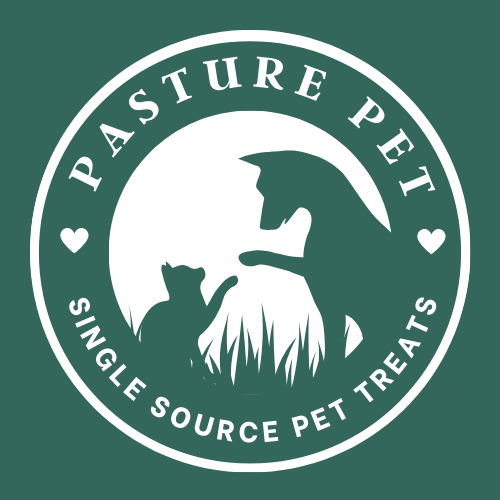Walk down the pet aisle these days and it’s overwhelming — rows and rows of bags, boxes, and pouches promising to be “healthy,” “natural,” or “premium.” At Pasture Pet, we hear from so many dog parents who are curious about choosing meat-based treats instead of cookie- or cracker-style snacks. The real question is: does it matter how that meat was raised?
The answer is yes — and here’s why.
Health Starts with Quality Meat
Your dog’s health is directly tied to the quality of the meat in their treats.
- Pasture-raised or humanely raised animals generally have a better nutrition profile, with more omega-3s, antioxidants, and fewer residues from antibiotics or growth hormones.
- Meat from stressed, confined animals can carry higher levels of inflammatory fats and stress hormones, which may affect sensitive dogs over time.
If you’re feeding treats every day, that difference really adds up.
Dogs with Allergies Do Better on Cleaner Meat
Just like people, some dogs are more sensitive than others. Pasture-raised or sustainably raised animals are usually fed simpler diets with fewer additives (and less GMO corn and soy). That means:
- A lower chance of hidden allergens sneaking into the meat
- Fewer chemical residues that can trigger stomach upset or itchy skin
For pups with food sensitivities, the source of the meat can make all the difference.
6 Common Ingredients to Avoid in Dog Treats
When you’re scanning a label, here are some red flags:
- Meat by-products & unnamed meats
- Look for clearly named proteins like “chicken” or “beef,” not vague terms like “meat meal” or “poultry by-product.”
- Artificial preservatives
- Choose natural options like mixed tocopherols (Vitamin E) or rosemary extract instead.
- Excessive glycerin
- Not toxic, but overused in cheap treats to make them chewy. Can cause loose stools, and low-grade industrial glycerin sometimes slips in.
- High levels of salt or sugar
- Added sugar, corn syrup, or extra salt contribute to obesity, dental issues, and dehydration. Dogs don’t need sweeteners to enjoy a treat!
- Corn, soy, or wheat fillers (if your dog is sensitive)
- Many dogs tolerate these, but they’re common triggers for allergies and digestive issues
- Propylene glycol
- Used to keep soft treats moist. While not antifreeze, it can still upset digestion — and it’s unnecessary in a healthy diet.
What to Look for Instead
- Single-ingredient treats (like our pasture-raised jerky) or limited-ingredient recipes
- Clearly named meat proteins: pasture-raised turkey, grass-fed beef
- Natural preservatives (mixed tocopherols, rosemary extract)
- No artificial colors, flavors, or sweeteners
- Treats made in countries with strong food safety standards (USA, Canada, New Zealand, EU
At the end of the day, treats should be simple, clean, and nourishing. By choosing pasture-raised meats and avoiding the fillers, you’re not just rewarding your dog — you’re supporting their long-term health and happiness
Here’s to many tail wags, happy bellies, and healthy pups. 🐾
— The team at Pasture Pet


